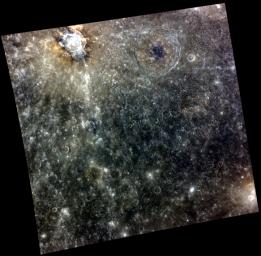In the top left part of this image is Seuss, a complex crater with hollows present on the crater's floor. In this enhanced color image, the hollows appear as bright blue-white features. Just outside of Seuss' rim, you can see some material that appears darker brown in the image. This is LRM, or Low Reflectance Material, and was probably excavated by the impactor when Seuss was formed. Extending from Seuss are bright crater rays, which are streams of ejecta that were thrown from the crater upon impact. In the bottom right of the image, you can see an irregularly shaped, orange-yellow depression that could be a volcanic vent.
This image was acquired as part of MDIS's high-resolution 3-color imaging campaign. The map produced from this campaign complements the 8-color base map (at an average resolution of 1 km/pixel) acquired during MESSENGER's primary mission by imaging Mercury's surface in a subset of the color filters at the highest resolution possible. The three narrow-band color filters are centered at wavelengths of 430 nm, 750 nm, and 1000 nm, and image resolutions generally range from 100 to 400 meters/pixel in the northern hemisphere.
Date acquired: July 08, 2014
Image Mission Elapsed Time (MET): 47121909, 47121901, 47121905
Image ID: 6643252, 6643250, 6643251
Instrument: Wide Angle Camera (WAC) of the Mercury Dual Imaging System (MDIS)
WAC filters: 9, 7, 6 (996, 748, 433 nanometers) in red, green, and blue
Center Latitude: 2.83º
Center Longitude: 37.11º E
Resolution: 528 meters/pixel
Scale: Seuss is 64 km (40 miles) in diameter
Incidence Angle: 15.8º
Emission Angle: 12.2º
Phase Angle: 28.0º
The MESSENGER spacecraft is the first ever to orbit the planet Mercury, and the spacecraft's seven scientific instruments and radio science investigation are unraveling the history and evolution of the Solar System's innermost planet. MESSENGER acquired over 150,000 images and extensive other data sets. MESSENGER is capable of continuing orbital operations until early 2015.
For information regarding the use of images, see the MESSENGER image use policy.

 Planetary Data System
Planetary Data System












